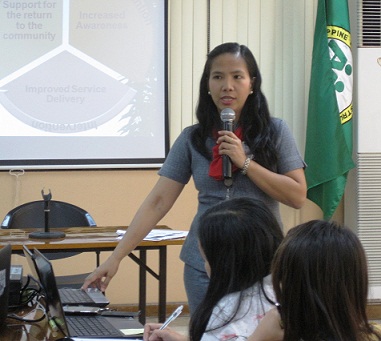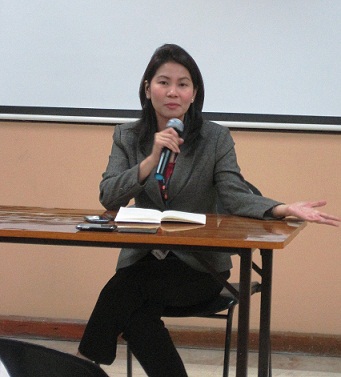Text and photos by ELIZABETH LOLARGA
 PREDATORS are taking advantage of the series of disasters, super typhoon Yolanda being the topmost. They target women and children, the most vulnerable in any natural and/or manmade calamity.
PREDATORS are taking advantage of the series of disasters, super typhoon Yolanda being the topmost. They target women and children, the most vulnerable in any natural and/or manmade calamity.
A social worker and an official from the United Nations Population Fund (formerly UNFPA) shared this at WomanHealth Philippines’ forum on “Preventing VAW in Disaster Situations, Ensuring Safety of Women and Children in Emergency Settings” at the Philippine Rural Reconstruction Movement office in Quezon City.
VAW means violence against women. It has since been expanded into VAWC to include children. VAWC covers domestic violence, sexual abuse and human trafficking. Caroline Jimenez, Department of Social Welfare and Development (DSWD) social technology bureau officer, said, “If a woman suffers VAW, so do her children.”
She added that critical stress debriefing (CSD) is provided both for hungry people after they’re fed and for service providers. CSD for the latter group, she said, “prepares them to return to normal life. They need debriefing to face people again and listen to their sad stories. We do capability building for victims and service providers.”
Her office received Wednesday last week a report of an attempt by human traffickers to lure women survivors in Balacbac, Palawan, with jobs in Sabah. Palawan is an exit point close to that Indonesian island.
She said DSWD already raised the alert for suspected traffickers at all possible exit points: Manila North Harbor, Matnog in Sorsogon, even at VAB. Social workers at VAB encountered people who’d like to help victims directly. These strangers said, “We’d like to hire them as house help (or waitresses or sales ladies).”
The social workers refer them to their barangays to inquire about people who can be hired in their areas. The answer they get is: “Barangay officials are lazy. We’d like to hire these women on the spot.”
Jimenez warned, “Illegal recruiters are coming in. They mask themselves as volunteers who give CSD. We’ve announced repeatedly, ‘Don’t trust anybody approaching you about jobs abroad.’”
She said Yolanda’s women survivors have little or no money, describing how a group of them were found in a van. These women were offered money immediately for overseas jobs. It turned out that the recruiters were going to bring them to prostitution dens in Angeles City, Pampanga.
She said a women-friendly structure (WFS) within evacuation grounds is necessary. “It must be well-built to be safe and secure. It should be enclosed so ensure confidentiality. Within an enclosed area, there must also be a breastfeeding spot. Incest and rape happen in evacuation centers.”
She continued, “A child-friendly space protects children from all forms of exploitation, abuse, and trafficking, from sexual and gender-based violence, from psycho-social distress. Cases of missing children have been reported at VAB. They are separated from their families or they arrive unaccompanied. It’s easy for traffickers to lure them with money or toys to get them out of evacuation centers.”
The child-friendly space ensures these kids of educational and recreational activities and alternative lessons to realize their basic right to education because their schooling is disrupted.
 Jhie Mojica of the Council for the Welfare of Children said her organization processes the children at the VAB grandstand, then endorse them to a child-friendly space while their parents or elders line up to get relief goods.
Jhie Mojica of the Council for the Welfare of Children said her organization processes the children at the VAB grandstand, then endorse them to a child-friendly space while their parents or elders line up to get relief goods.
Pamela Averion, UNFPA national program officer for gender, said, “Two percent of women of reproductive age–from 15 to 49 years old–will experience gender-based violence in a humanitarian setting. There is a cultural silence and stigma against survivors of gender-based violence.”
In a tent city, for example, she said women need privacy while changing their clothes or doing their washing. Girl children are left to care-givers available and become vulnerable to molestation or rape.
Apart from their accessing the WFS immediately after a disaster, these survivors must receive what Averion called “hygiene or dignity kits.” The kit includes a pail, fresh underwear, sanitary pads, toilet paper, flashlight and whistle, the last to call for help. She said these things are forgotten in times of disaster because the mobilization is often to bring food and water first. The kits are specific to women who flee the disaster scene with just the clothes on their back.
She said lactating mothers under stress lose the capacity to nurse their babies. They’re also helped in overcoming stress and re-lactating. She spoke of how mothers who couldn’t nurse their children walk kilometers to look for milk but expose the babies to infection from unclean water.
Women’s Crisis Center’s Amelia Suarez described how women and girls at evacuation centers undergo “double disaster.” Changing of partners is not unusual while families are crammed, lying side by side at night. Much more than vigilance is required at times like these.
